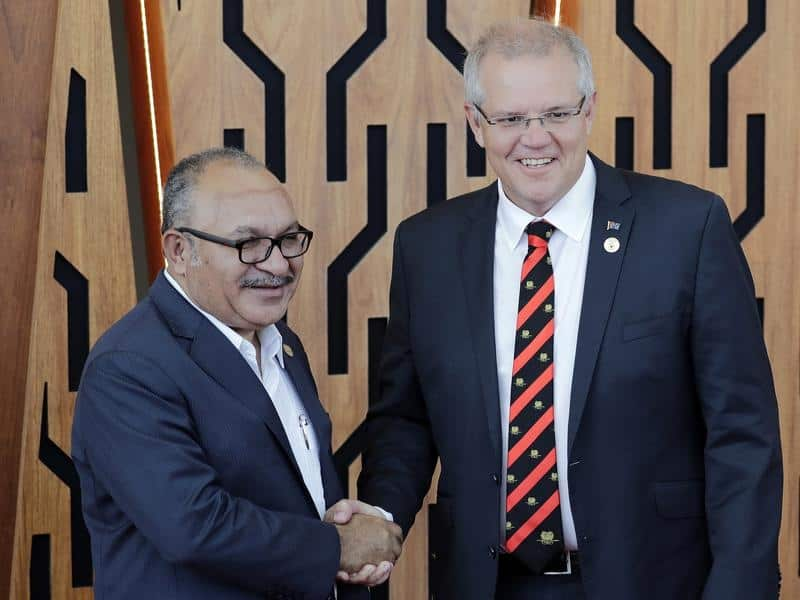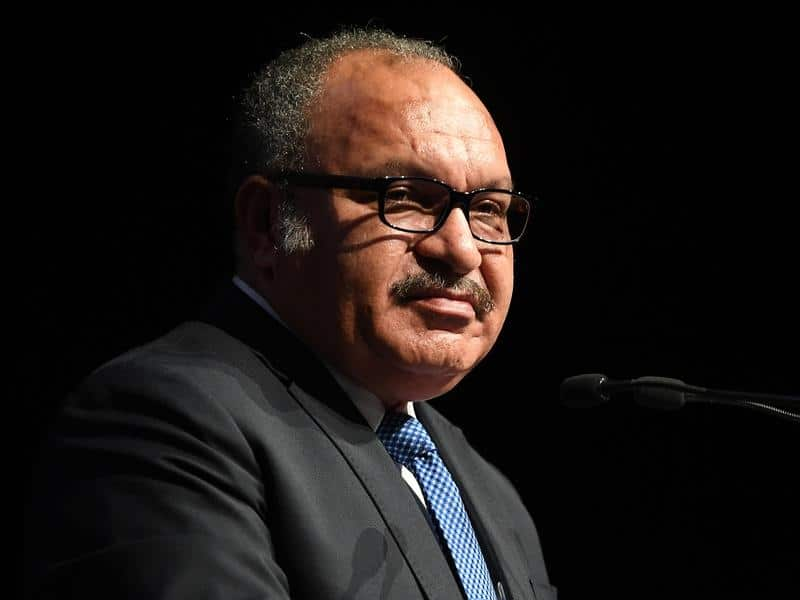An expert on Papua New Guinea affairs says the outcome of the political turmoil in the Pacific island country is uncertain.
Papua New Guinea's Prime Minister Peter O'Neill announced on Sunday he would , citing a need for change following the resignations of several of his ministers.
Associate Professor Sinclair Dinnen from the Australian National University's School of Asia Pacific Affairs said its a 'wait and see' situation.
Australia's Foreign Minister Marise Payne said she that bilateral relations will be unaffected by the leadership crisis.
Justifying his decision, Mr O'Neill said the leadership change was "in the best interest of the country" and would allow the current government to continue the implementation of its policy agenda.
"We have agreed to a change in direction," Mr O'Neill said on Sunday, naming Sir Julius Chan as his successor.
"That the leadership in our government will be under Sir Julius Chan [who is] a veteran leader and one of our founding fathers of our great nation."
Professor Dinnen said it is not certain whether Sir Julius Chan will take on the top job for a third time, after serving in 1980-1982 and 1994-1997.
He said the parliament, not the Prime Minister, will make that decision. "He [Peter O'Neill] hasn’t actually officially tendered his resignation yet," Professor Dinnen told SBS News.
"He [Peter O'Neill] hasn’t actually officially tendered his resignation yet," Professor Dinnen told SBS News.

PNG Prime Minister Peter O'Neill and Australian PM Scott Morrison. Source: AAP
"Despite the noise surrounding this announcement, he remains Prime Minister until that occurs."
Instead, Professor Dinnen said a 'vote of no confidence' is still looming in the PNG parliament.
Mr O'Neill avoided a planned vote of no confidence in him earlier this month by adjourning parliament for three weeks.
"This decision is one that will be finalised on the floor of parliament," Professor Dinnen said.
"That will be what decides who is Prime Minister, whether that's from the current government or a new government."
The Opposition bloc said with 63 MPs it has the numbers to form a majority in 111-seat parliament and thus create a new government. The current government has 48 MPs.
'Feeling of despair'
Professor Dinnen said this is a situation that has been developing for a long time.
After weeks of high-level defections from his party and an announcement from his opposition that they had the numbers to oust him, Mr O’Neill said it was time for a change.
But Professor Dinnen said the unrest has been occurring for years.
He said PNG residents, particularly in rural areas, are losing faith in the their government as they fail to see the economic benefits from mining activity in the mineral-rich country.
"The people of PNG want improved services, just like anyone else," Professor Dinnen said.
"Their country has been endowed with valuable resources. They are seeing those mined and developed but they are not seeing that translated on a national level in development and quality of life for them.
"There's a feeling of despair and levels of poverty that are unacceptable. The quality of services is declining.
"There’s been a lot of promise and rhetoric about how things will be from governments and the reality for people in rural areas is very different." Professor Dinnen also cited corruption allegations as contributing to the push for new leadership.
Professor Dinnen also cited corruption allegations as contributing to the push for new leadership.

Papua New Guinea Prime Minister Peter O'Neill. Source: AAP
"There’s been allegations of corruption among the political elite in the O’Neill administration," he said.
"They’re quite serious allegations. That high level of corruption has also contributed to a desire for new leadership."
'We just don't know'
Mr O'Neill said he will official resign this week with a visit to the Governor General, which would will allow the parliament to vote on a new Prime Minister.
A vote of no confidence could be expected as early as Tuesday when the parliament sits, but a vote may take more than a week to take place because of parliamentary protocols.
The Opposition has not revealed who its candidate for Prime Minister will be.
One of the leaders of the Opposition bloc, Patrick Pruaitch, said a secret ballot would be the ideal way to choose a candidate to ensure consensus.
The opposition group has also warned that methods of "sabotage" could be used to interrupt parliament on Tuesday and have asked state-run enterprises to maintain the power and water supply to the building.
Professor Dinnen said the outcome will be more difficult to predict.
"A lot of negotiation goes on behind closed doors so it's quite opaque at the moment," he said.
"What is for sure is that there will be attempts to woo people in each camp to the other side.
"We just don’t know what the outcome will be until we see the numbers."
Professor Dinnen said what happens over the next few weeks will depend on the numbers, but he doesn't see huge ramifications from the political crisis in Papua New Guinea.
"Governments come and go," he said.
"A change of government will essentially just mean a new Prime Minister for Papua New Guinea."

